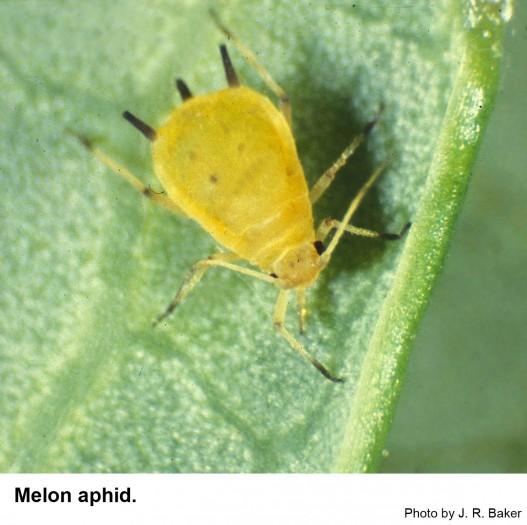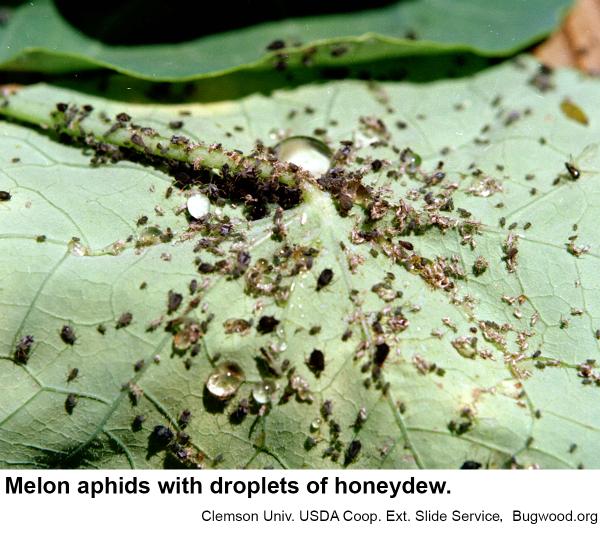Description and Biology
The melon aphid, Aphis gossypii, has two definite color forms: a yellowish green form and a very dark green form that appears to be black until examined in strong light. The wingless adults are soft bodied, yellow to dark green, and about 1.0 to 1.5 mm long. The adults that are lighter in color tend to be smaller and have fewer antenna! segments than the darker adults. The winged adult is also soft bodied and yellow to dark green. It has a black head and thorax with the wings held rooflike over the abdomen. The antennae and cornicles are longer than those of the wingless adult. The winged form is about 1.25 mm long. The nymph is smaller than but similar in shape and color to wingless female adults. In the Southeast, melon aphids may spend part of the winter as wingless adults in soil or field debris. During warm periods, they travel to weedy hosts and continue feeding until cold weather forces them back into hibernation. In spring, winged females fly to suitable host plants and give birth to living young. Each female produces an average of 84 nymphs. Under favorable conditions, a nymph matures in about 5 days and begins producing its own progeny. Most nymphs develop into wingless adults. However, when crowding occurs or food becomes scarce, winged adults develop and fly to new host plants. Reproduction continues through the winter as in the summer but at a much slower rate. Many overlapping generations are produced each year.
Host Plants
Asparagus, beans, begonia, catalpa, citrus, clover, cotton, gardenia, ground ivy, hops, hydrangea, melons (and other cucurbits), okra, spinach, strawberries, tomatoes, violet, and weeds are some of the hosts of melon aphids. They have been discovered feeding on plants in 25 plant families. Melon aphids feed by piercing the plant surface with the threadlike mouthparts to suck out plant juices. This feeding causes distorted growth, decreased yield, reduced quality of yield, and prematurely ripened fruit. Fruit may be covered by the feeding aphids, honeydew, and cast skins. Melon aphids transmit several important plant viruses, including citrus quick decline, cucumber mosaic, lily symptomless, lily rosette, and onion yellow dwarf diseases.
Residential Recommendation
Syrphid maggots and ladybird beetles and larvae feed upon melon aphids. Braconid wasps parasitize the aphids. Ants feed upon the honeydew excreted by feeding aphids. Because melon aphids have become resistant to many insecticides, insecticidal soap or horticultural oil may be most effective for control. Adequate coverage is quite important for aphid management as thick foliage may shelter the aphids from the pesticide residue.
References
- Aphids on Ornamental Landscape Plants. Frank, S. D. 2009 (revised). Entomology Insect Notes, NC State Extension.
- Common name: melon aphid or cotton aphid, scientific name: Aphis gossypii Glover (Insecta: Hemiptera: Aphididae). Capinera, J. L. 2009. Feartured Creatures. Entomology & Nematology, FDACS, DPI, EDIS.
- Insect and related Pests of Flowers and Foliage Plants. Baker, J. R., ed. 1994. North Carolina Cooperative Extension Service Publication AG-136. 106 pp.
- Insect and Related Pests of Shrubs. Baker, J. R. ed. 1980. NC Agricultural Extension Service publication AG-189. 199 pp.
- Extension Plant Pathology Publications and Factsheets
- Horticultural Science Publications
- North Carolina Agricultural Chemicals Manual
For assistance with a specific problem, contact your local N.C. Cooperative Extension Center.
This Factsheet has not been peer reviewed.
Publication date: May 17, 2013
Revised: May 8, 2023
Recommendations for the use of agricultural chemicals are included in this publication as a convenience to the reader. The use of brand names and any mention or listing of commercial products or services in this publication does not imply endorsement by NC State University or N.C. A&T State University nor discrimination against similar products or services not mentioned. Individuals who use agricultural chemicals are responsible for ensuring that the intended use complies with current regulations and conforms to the product label. Be sure to obtain current information about usage regulations and examine a current product label before applying any chemical. For assistance, contact your local N.C. Cooperative Extension county center.
N.C. Cooperative Extension prohibits discrimination and harassment regardless of age, color, disability, family and marital status, gender identity, national origin, political beliefs, race, religion, sex (including pregnancy), sexual orientation and veteran status.


